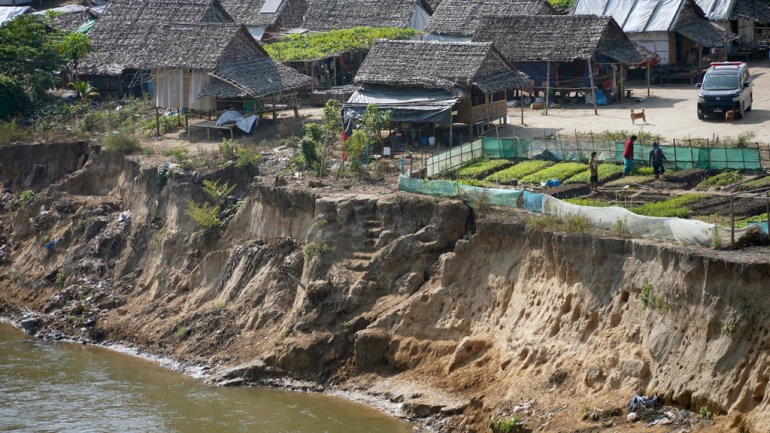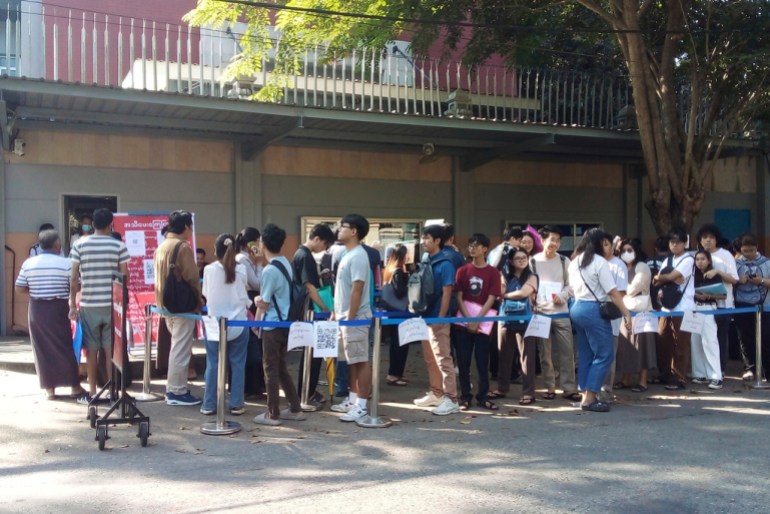Ko Naing* is just the sort of young man Myanmar’s military is looking for.
Hoping to make up for recruitment shortfalls and battlefield losses against armed groups fighting to reverse its 2021 coup, Myanmar’s military last month announced plans to enforce a years-old conscription law.
Starting in April, the military says, all men aged 18 to 35 years and women from 18 to 27 years must serve at least two years in the armed forces.
Doctors and other professionals in especially short supply in the military’s ranks may be drafted until they are 45 years old. The country’s military rulers hope to call up approximately 60,000 recruits by the end of the year.
As a doctor, and at a healthy 33 years old, Ko Naing fits the bill for conscription.
Like many of Myanmar’s young men and women, Ko Naing said he had no intention of answering the call and would instead do whatever it takes to avoid the draft.
“The one sure thing is I won’t serve. If I’m drafted by the military, I will try to move to the remote areas or to another country,” Ko Naing told Al Jazeera from Myanmar.
“Not only me, I think everyone in Myanmar is not willing to serve in the military under the conscription law,” he said. “The people believe it is not legal because the people believe the military is not their government.”
The 2021 coup that removed the democratically elected government of Aung San Suu Kyi has plunged Myanmar into a brutal civil war pitting the military against a patchwork of deep-rooted, well-armed ethnic minority armies and a new crop of local armed groups set up to remove the military regime from power.
Having already stretched the military thin across the country, these ethnic armies have forced the military to retreat from dozens of towns and bases since October, mainly in the east. The six-month-old campaign, dubbed Operation 1027, has handed the ruling generals their worst string of defeats of the war.
“The timing of the activation of the conscription law indicates its desperation,” said Ye Myo Hein, an adviser to the US Institute of Peace and fellow at the Wilson Center in Washington, DC.
“Following Operation 1027, the junta has faced continuous and significant military losses, resulting in a substantial depletion of its human resources and a serious shortage of manpower. In response to this situation, the military has opted to activate the conscription law to replenish its declining manpower,” Ye Myo Hein said.
He also doubts the draft will do the military much good. The intake of recruits may help boost the morale of commanders on the front lines running short of soldiers, Ye Myo Hein said, but is unlikely to stem the military’s losses.
“The new recruits may not be effective fighters in the short term. If deployed on the battlefronts, they could end up as cannon fodder,” he said.
Ye Myo Hein said the draft could also backfire on the military by filling its ranks with resentful soldiers who could pose a threat from within, and by driving more young people into the arms of the resistance.

‘No one … is safe’
The military says the draft will start next month with an initial batch of 5,000 conscripts. Unofficially, though, it may have started already.
In a recent statement, the United Nations special rapporteur on human rights in Myanmar, Tom Andrews, relayed reports of young men being effectively “kidnapped” off the streets by the military and forced to the front lines.
The New Myanmar Foundation, a charity based in Thailand helping those fleeing the war, says it has also heard of soldiers and police raiding teashops across the country in recent weeks in search of young men and women to press them into service.
“They are now losing, so they need the youth to fight for them,” the foundation’s executive director, Sann Aung, told Al Jazeera from the Thai border town of Mae Sot.

Activists, journalists and others in the military’s crosshairs have been fleeing the country – many of them by irregular means – amid a crackdown on critics and dissidents since the coup in February 2021. Now it is feared that the new conscription drive will turn a stream of political migrants into a flood.
In his statement, UN rapporteur Andrews warned that the numbers leaving Myanmar would “surely skyrocket” because of the draft.
Ye Myo Hein also warned of a “mass exodus”.
“People living in urban areas have been attempting to normalise their lives amidst the post-coup abnormality to some extent. However, the conscription law unequivocally gives the signal that no one, even those outside conflict zones, is exempt from the repercussions of the military coup and is safe,” he said.
Sann Aung said he has already seen the numbers fleeing to the Thai border swell and echoed the forecasts of a growing surge.
He said many travel to the relative safety of Myanmar’s rugged and remote borderlands, where some of the country’s strongest ethnic armies have over the decades carved out enclaves largely independent of the central government. Some go to join the fight against the military, others just to hide.
“This is the cheapest and the most convenient way for them,” Sann Aung said. “But some people who [may] have more … money and cash, they move to the neighbouring areas, neighbouring countries, including Thailand and India and maybe China.”
He and other close observers say that most of those fleeing are heading to Thailand, drawn by a large diaspora from Myanmar from before the coup, as well as better job prospects and a government in Bangkok that has kept Myanmar’s military at a distance — at least compared with China and India, which have been arming the generals.
Phoe Thingyan of the Overseas Irrawaddy Association, another charity for the displaced based in Mae Sot on the Thai border, said since news of the conscription plan emerged, the numbers arriving at the border or crossing over have been “increasing every day”.
‘Legally or illegally’
Overwhelmed by a recent surge of visa applicants at its embassy in Myanmar, Thailand has capped the number of people allowed to apply for an entry visa per day at 400. Even after doubling that daily limit to 800, application places have filled up for weeks ahead.
Newly desperate to get travel documents to leave the country, hundreds of people swarmed a passport office in Mandalay, the country’s second-largest city, on February 19, and accidentally killed two queue tokens vendors in the crush.

Phoe Thingyan and Sann Aung say those crowded out of the visa and passport process will probably leave anyway, however they can.
Thura*, 33, is one of those making plans to escape should he need to flee.
A human rights worker, Thura said he hopes he can avoid the draft as the sole caregiver to elderly parents, one of a handful of exemptions in the conscription law.
“But if the military still tries to force me to serve, I will try to move to Thailand,” he said, “legally or illegally”.
Thura says the current rate for a covert trip from Mandalay to the Thailand border is 2.5 million kyats (about $1,200), including border smuggler’s fees.
Wary of a new wave of people fleeing from Myanmar, Thai Prime Minister Srettha Thavisin has warned that anyone caught crossing the border illegally will face “legal action”.
Undeterred by the potential repercussions, Thura is resolved not to fight for a military widely accused of waging an indiscriminate war that has killed thousands of civilians, displaced millions and tipped Myanmar into chaos.
His reasons are personal as well as political. Thura tells how friends who joined armed groups fighting the military have been killed in battle, and that another who was arrested for simply protesting against the military coup has been sentenced to death.
“If I’m forced to serve in the military, I will try to move to another place or another country,” he said.
“But if I fail and I’m caught and forced to serve, I will try to escape and run away. I cannot shoot at my friends.”
*Some names have been changed to shield the identities of individuals worried about their safety.
#Fears #mass #migration #Myanmar #military #plans #draft #thousands #Conflict #News
